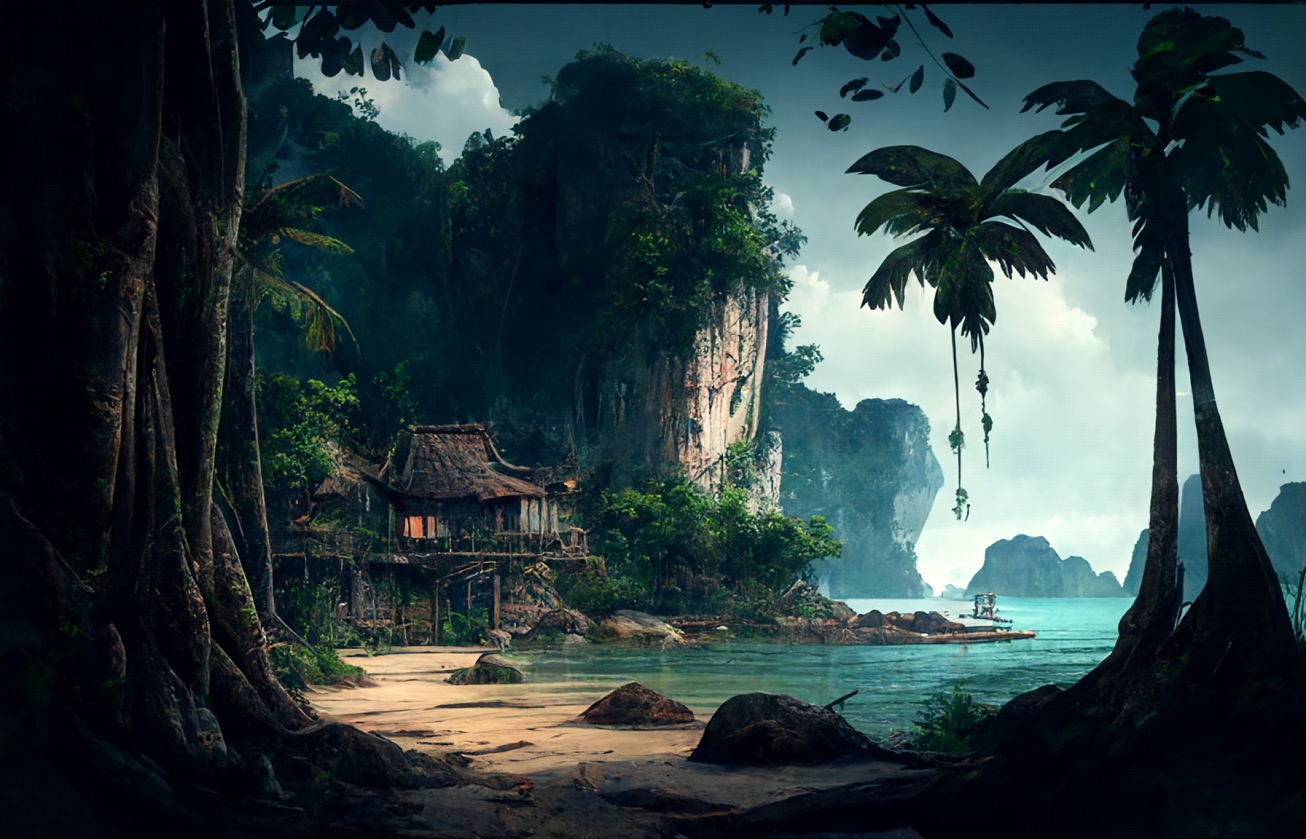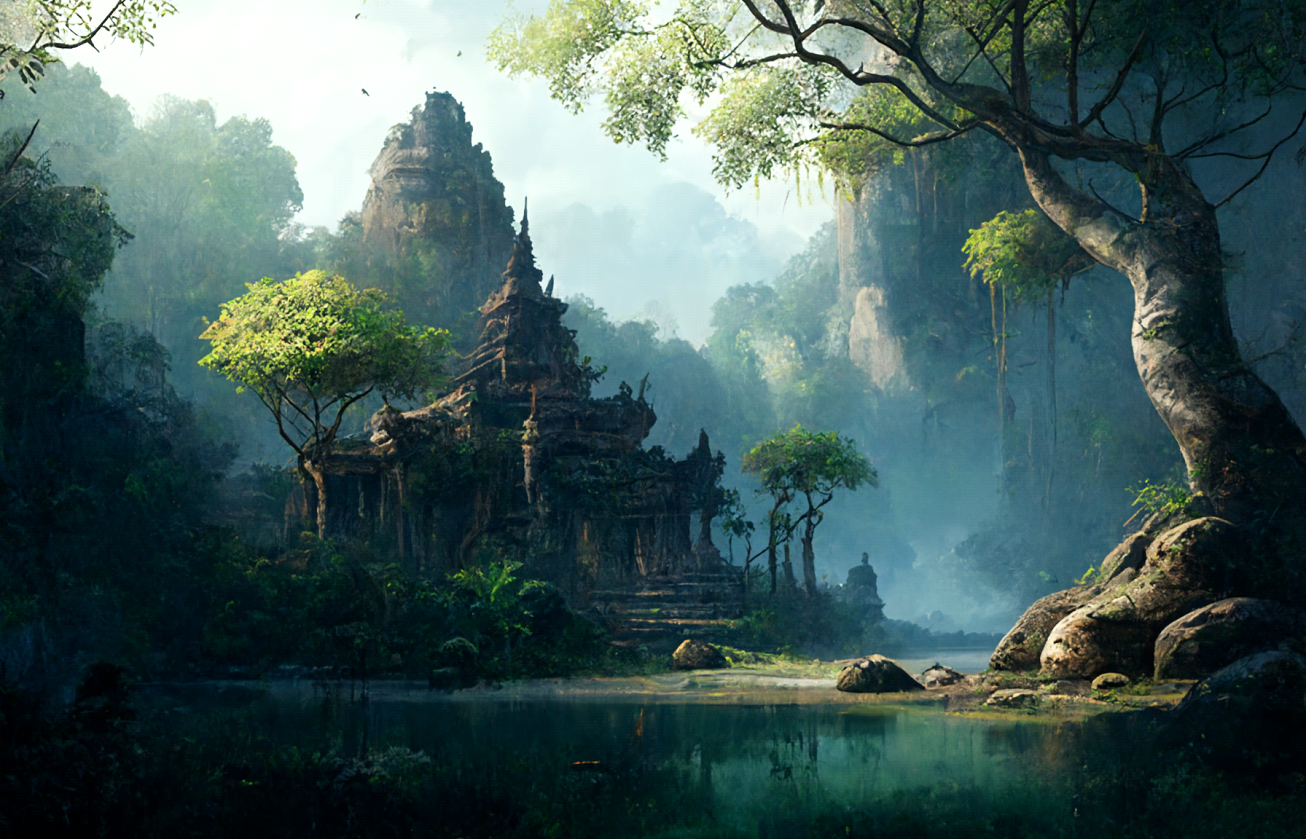Mu Xian’va
Pronunciation: moo-SHON-va
Map Index: E-14, E-16, F-13, F-14, F-15, F-16, G-15
Location: The mostly sunken continent of Mu Xian’va, far east of Nhulokkarnum
Description: Mu Xian’va, is the broken remnants of a once great and powerful empire. Populated by humans, it spans across a diverse multitude of islands scattered throughout the vast expanse of the Great Eastern Sea. Today, the descendants of these survivors remain a fragmented and lost people, bearing little recollection of their people’s former glory. The landscape of Mu Xian’va is strewn with shattered remnants of ancient stone temples and buildings, with many now repurposed as humble dwellings for subsistence farmers. Dense forests have reclaimed much of the land, obscuring the grandeur of pre-cataclysm structures. Once proud cities remain lost to all knowledge hidden by dense forest cover and resembling little more than tree covered hills.
Residents: The inhabitants of the islands consist of humans and humanoids that were victims of chaos storms that transformed them into other forms. On the main island of Mu Xian'va, humans predominate. However, they are constantly challenged by small populations of the warlike Kuru who attack them frequently. On the myriad number of other islands, humans find themselves in the minority as significant populations of Gillmen and Veng can be found. The Veng, who somewhat resemble the Kuru, are the least corrupted and can pass as human except for the slightly webbed fingers and toes, along with the beginnings of gills. The Gillman on the other hand have much more advanced aquatic features and require spending a significant portion of each day in the water.
Primary Population: Mu, Veng
Secondary Population: None
Minor Population: Ansharri, Chuuli, Movori, Valmyrri
The inhabitants of Mu Xian'va possess almost no knowledge of arcane magic. The once powerful colleges of magic that were situated in large cities were swept away by enormous tsunamis or destroyed by earthquakes during the cataclysm. What knowledge survived the early years was eventually lost. Divine magic is still in use but there are a limited number of priests.
Government and Politics: Today Mu Xian'va is comprised of a collection of independent city-states and small rural tribes. With no central government of any kind, each population center fends for itself.
Economy: The economy is subsistence agriculture. Each population center grows what they can and some internal trade takes place when a local surplus occurs. Few items are exported.
Military: Ill equipped to handle the challenges that it faces, poorly equipped militias and armies attempt to maintain order and defend their land, but their efforts are often grossly insufficient against well-organized attackers. This leaves the small islands and coastal villages exposed to the frequent threat of slavers and coastal raiders. The Veng in particular frequently raid the islands for items they need.
History: Once a flourishing and sophisticated empire, Mu Xian'va suffered immensely from the tragic prodigious devastation wrought by the Great Cataclysm. Great tsunamis relentlessly pounded the coastlines while unrelenting violent earthquakes wracked the cities until there was little left but crumbled ruins. Within a few weeks more than half of the kingdom was submerged beneath the sea. When it was finally over only a few scattered pockets of survivors remained.
Today: The society of Mu Xian’va is an agrarian subsistence-level economy. Most of the population struggles daily to meet their basic needs, grappling with the vast challenges of living in a fragmented and devastated kingdom.
Despite their dire circumstances, the people of Mu Xian'va continue to persevere, eking out a living amidst the remnants of their fallen empire. The islands bear witness to a rich history that has been largely erased, with the surviving population yearning to rediscover their lost heritage. The challenges they face are formidable, but the indomitable spirit of the people of Mu Xian'va serves as a testament to their resilience and their potential to rebuild and reclaim their place in the world.
Map Index: E-14, E-16, F-13, F-14, F-15, F-16, G-15
Location: The mostly sunken continent of Mu Xian’va, far east of Nhulokkarnum
Description: Mu Xian’va, is the broken remnants of a once great and powerful empire. Populated by humans, it spans across a diverse multitude of islands scattered throughout the vast expanse of the Great Eastern Sea. Today, the descendants of these survivors remain a fragmented and lost people, bearing little recollection of their people’s former glory. The landscape of Mu Xian’va is strewn with shattered remnants of ancient stone temples and buildings, with many now repurposed as humble dwellings for subsistence farmers. Dense forests have reclaimed much of the land, obscuring the grandeur of pre-cataclysm structures. Once proud cities remain lost to all knowledge hidden by dense forest cover and resembling little more than tree covered hills.
Residents: The inhabitants of the islands consist of humans and humanoids that were victims of chaos storms that transformed them into other forms. On the main island of Mu Xian'va, humans predominate. However, they are constantly challenged by small populations of the warlike Kuru who attack them frequently. On the myriad number of other islands, humans find themselves in the minority as significant populations of Gillmen and Veng can be found. The Veng, who somewhat resemble the Kuru, are the least corrupted and can pass as human except for the slightly webbed fingers and toes, along with the beginnings of gills. The Gillman on the other hand have much more advanced aquatic features and require spending a significant portion of each day in the water.
Primary Population: Mu, Veng
Secondary Population: None
Minor Population: Ansharri, Chuuli, Movori, Valmyrri
The inhabitants of Mu Xian'va possess almost no knowledge of arcane magic. The once powerful colleges of magic that were situated in large cities were swept away by enormous tsunamis or destroyed by earthquakes during the cataclysm. What knowledge survived the early years was eventually lost. Divine magic is still in use but there are a limited number of priests.
Government and Politics: Today Mu Xian'va is comprised of a collection of independent city-states and small rural tribes. With no central government of any kind, each population center fends for itself.
Economy: The economy is subsistence agriculture. Each population center grows what they can and some internal trade takes place when a local surplus occurs. Few items are exported.
Military: Ill equipped to handle the challenges that it faces, poorly equipped militias and armies attempt to maintain order and defend their land, but their efforts are often grossly insufficient against well-organized attackers. This leaves the small islands and coastal villages exposed to the frequent threat of slavers and coastal raiders. The Veng in particular frequently raid the islands for items they need.
History: Once a flourishing and sophisticated empire, Mu Xian'va suffered immensely from the tragic prodigious devastation wrought by the Great Cataclysm. Great tsunamis relentlessly pounded the coastlines while unrelenting violent earthquakes wracked the cities until there was little left but crumbled ruins. Within a few weeks more than half of the kingdom was submerged beneath the sea. When it was finally over only a few scattered pockets of survivors remained.
Today: The society of Mu Xian’va is an agrarian subsistence-level economy. Most of the population struggles daily to meet their basic needs, grappling with the vast challenges of living in a fragmented and devastated kingdom.
Despite their dire circumstances, the people of Mu Xian'va continue to persevere, eking out a living amidst the remnants of their fallen empire. The islands bear witness to a rich history that has been largely erased, with the surviving population yearning to rediscover their lost heritage. The challenges they face are formidable, but the indomitable spirit of the people of Mu Xian'va serves as a testament to their resilience and their potential to rebuild and reclaim their place in the world.

